ENVIRONMENTAL, SOCIAL AND GOVERNANCE
Committed to responsible growth
At Triveni, we are leading the way in building a more equitable and sustainable growth through our businesses. Our ESG approach is focussed on delivering measurable impact, guiding us to act responsibly, innovate for a better tomorrow, and create lasting value for all stakeholders. We are taking decisive steps to build a future that is inclusive, resilient, and responsible.
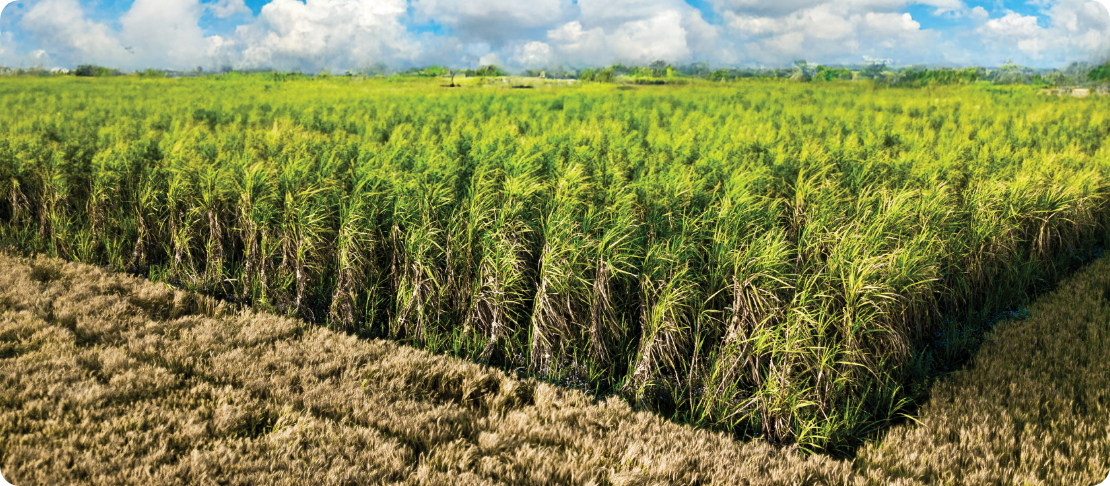
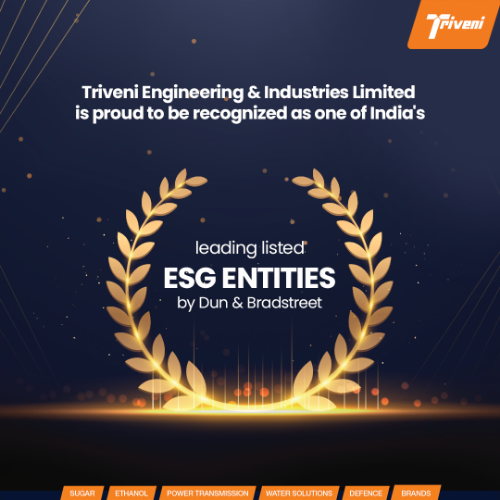
Triveni was recognised as one of India’s leading ESG Entities 2024 by Dun & Bradstreet. The award highlights our excellence in ESG practices and the ongoing targeted initiatives we undertake to scale our impact.
Towards a low-carbon, circular future
Optimising carbon footprint
We are actively reducing carbon emissions across our operations. At our sugar units, the 104.5 MW cogeneration capacity fulfils captive power requirements while significantly lowering our carbon footprint. Additionally, using molasses to produce fuel ethanol helps reduce dependence on fossil fuels.
Our Power Transmission business enables diverse industries on their renewable energy journey by supplying value-engineered solutions. We invest in R&D to reduce energy losses and enhance system efficiency. Further, sustainability efforts like LED lighting, ~85% captive wind power generation, variable frequency drives and use of sea transport ensure efficient energy or fuel consumption. Diesel generators are strictly used for back-up power and are operated at full load to maximise efficiency.
Air pollution management
Our sugar and distillery units utilise advanced pollution control technologies like bag filters, electrostatic precipitators and wet scrubbers in steam boilers. These systems help maintain air quality and minimise any impact on vegetation and surrounding communities.
Water and wastewater management
We ensure zero liquid discharge (ZLD) operations across the distillery and power transmission businesses through investments in water treatment plants and incineration boilers. We not only ensure effective water treatment but also recycle and reuse it in operations, reducing fresh water consumption and preventing soil degradation. Our PTB has 8 lakh litres of rainwater harvesting capacity, which is used for cooling and gardening purposes.
Additionally, as a frontrunner in integrated water and wastewater treatment solutions, we offer a range of solutions that assist municipalities and industries in overcoming critical water challenges. To safeguard the environment and ensure adherence to the Government’s ZLD policy, we use the latest available technologies. We have also established a collaboration with CII, CII Triveni Water Institute, that engages with stakeholders and focusses on using innovative tools to enhance water security in India.
Waste management and waste-to-wealth efforts
In our Power Transmission Business, gearbox oil and lubricants used during manufacturing and testing are carefully collected, stored, and sent for recycling through vendors approved by the State Pollution Control Board.
Our sugar and alcohol businesses effectively repurpose co-products generated during operations such as bagasse, molasses, and press mud to create value-added products. These efforts not only improve sustainability but also contribute to a circular economy by turning waste into resources.
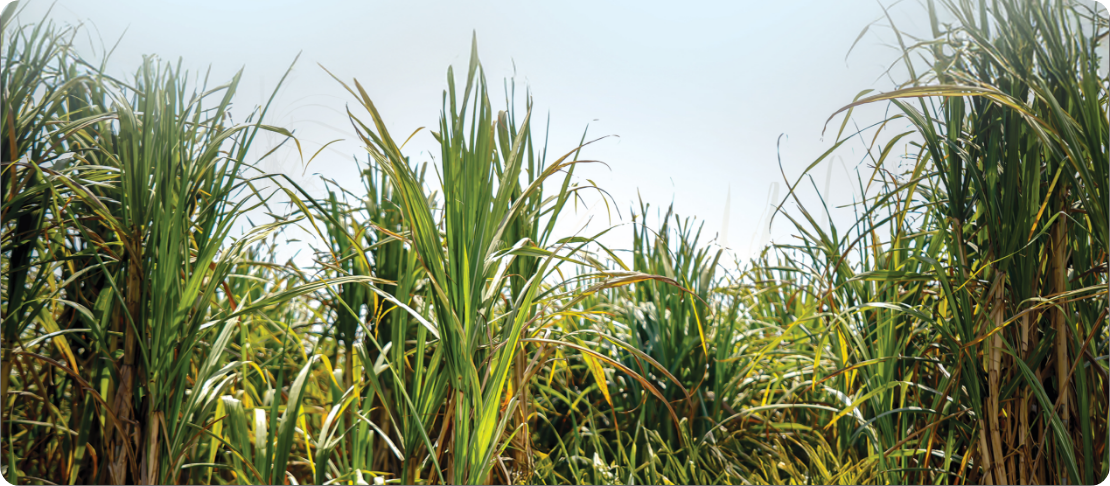
Co-products
Co-generation
Alcohol
Potash rich ash
(Derived from slop incineration, a concentrated spent wash from molasses/syrup to ethanol conversion).
Carbon dioxide (CO2 )
Fly ash
(Derived from bagasse during the steam and power generation process).
Press mud/filter cake
(a residue of cane processing rich in convertible substrates).
Distillers Dried Grain Solubles (DDGS)
Creating wealth from waste
Molasses (post levy obligation) used to produce ethanol for petrol blending and ENA for potable and industrial purpose.
Sold for potash fertiliser production, contributing to India’s potash self-sufficiency.
At Sabitgarh, CO2 from the fermentation is captured, compressed and sold as liquid CO2 and dry ice.
Sold for fly ash brick manufacturing/soil enrichment.
Currently, used as organic manure by farmers; plans to convert this into renewable biogas through anaerobic digestion.
It's a byproduct of the ethanol production process from grains, primarily used as a livestock feed. DDGS is rich in protein and energy, making it a valuable ingredient in animal diets
Building a resilient, sustainable agricultural ecosystem
We are supporting farmers in integrating sustainable agriculture practices that can drive resilience and minimise impact on the environment. Some of the key efforts include:
Sustainable sourcing
Our sustainability efforts extend beyond own operations to the value chain, focussing on sourcing materials ethically and in an environmentally responsible manner across the value chain. We are driving systematic changes in collaboration with our suppliers to build long-term resilience and shared value.
Integrating sustainability in sourcing
Sugar
- Sourcing strategy including vendor selection based on sustainable requirements and aligned performance objectives.
-
Efficient logistics arrangements, including the use of GPS and
geofencing, ensuring:
- Constant tracking of raw materials and products.
- Fuel and time-efficient goods movement with cane quality retained.
- Low emissions and associated costs.
- Streamlined bagasse flow from captive sugar units to cogeneration facilities, ensuring efficiency and sustainability.
Alcohol
- Feedstock (molasses, sugarcane juice/syrup and grain) sourced from own sugar mills and the market.
- Monitored and streamlined transport arrangements, ensuring efficient movement and uninterrupted operations.
Power Transmission business
- Orders placed with reliable vendors based on the criticality and vendor ratings.
-
Robust vendor selection criteria, including:
- Past performance, adherence to timelines and cost competitiveness.
- Compliance with laws, including our standards for EHS, product and service quality, and willingness to reduce cost, wastage and enhance productivity.
Water
- Most material supplies are custom-engineered, with approved vendors responsible for direct site deliveries following factory inspection.
- Robust framework in place for vendor evaluation, onboarding and capability building, alongside maintaining an approved vendors list for expedited sourcing.
Upholding strong governance principles
We are committed to ethical, transparent, and accountable business practices. Our comprehensive Code of Conduct – read and acknowledged by 100% of our employees – guides responsible behaviour across the organisation. This is reinforced by strong systems, policies, and processes. A robust governance framework, led by visionary leaders, ensures oversight and decisions aligned with stakeholder interests. The diversity of our Board in terms of independence, expertise, experience and competencies ensures the highest standard of governance. Over 60% of our Board is independent, which ensures unbiased oversight and enhanced accountability. We also have in place effective policies and a framework for Enterprise Risk Management as well as cybersecurity and data protection. These efforts ensured zero instances of regulatory breaches, non-compliance, or ethical violations in FY 25.
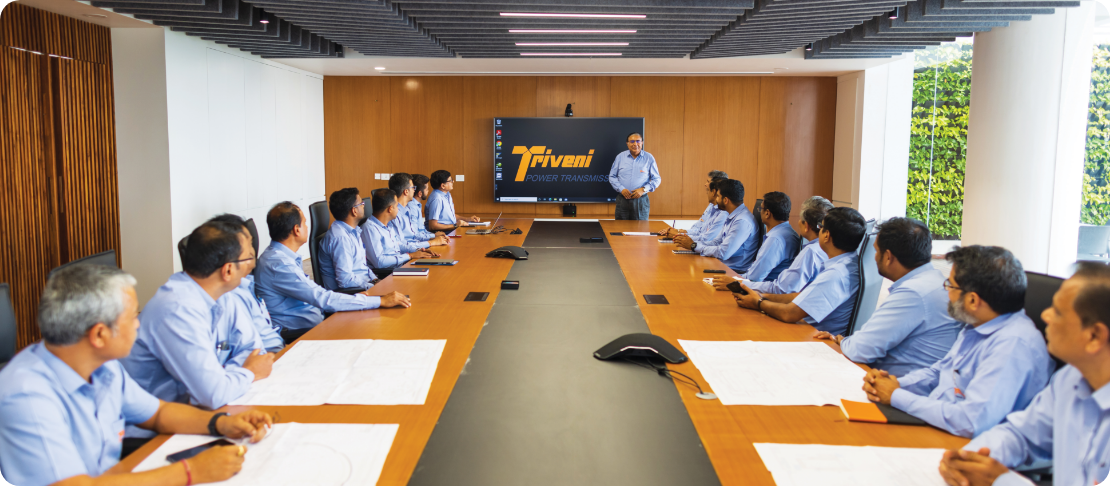
Celebrating excellence at LACP Vision Awards
Triveni Engineering & Industries Limited was recognised at the prestigious League of American Communications Professionals (LACP) Vision Awards 2023-24 for our Annual Report. This recognition is a reflection of our excellence in transparency and corporate reporting practices.
Platinum Award for excellence in Digital Report
Gold Award for excellence in Print Report
Special Achievement Award for Most Engaging Report Worldwide
#32 ranking globally with a score of 98/100, showcasing the quality of the annual report
© 2025 Triveni Engineering & Industries Ltd.
All Rights Reserved


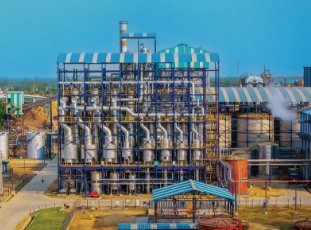
Social responsibility rooted in purpose
Fuelling farmer progress
We are committed to the socio-economic empowerment of our farmers through sustained partnerships and farmer-centric initiatives. We undertake focussed engagement programmes to help them adopt modern agronomic practices such as trench planting, ratoon management, and biological crop protection. This is achieved through field demonstration and training by our experts. We further support them by offering soil testing solutions, site-specific fertiliser recommendations, and subsidised organic inputs like press mud.
To combat the red rot disease affecting sugarcane over the past two years, we undertook an extensive varietal substitution programme to promote high-yielding, disease-resistant sugarcane varieties. This effort will help ensure better productivity and long-term farm resilience. We have also partnered with Sugarcane Breeding Institute, Coimbatore, for varietal evaluation and selection trials. We are deploying technologies like AI/ML, IoT, and satellite data to empower our farmers. Our dedicated Cane Development Portal and Mobile App offers real-time agro-advisory, weather updates, and issue resolution support. We further provide drone-based field surveillance and pesticide spraying services to tackle diseases. We have also released a Digital Board that provides training in plantation techniques and crop cycles, market information, precision farming methods and resource optimisation.
Delivering superior experiences to customers
We are dedicated to delivering superior value to our customers in the engineering segment, including PTB and water businesses. We combine domain expertise, advanced technologies and innovative engineering to deliver best-in-class solutions with a focus on reliability, precision, and long-term performance. Our commitment extends beyond delivery to responsive aftermarket support and operations and maintenance that ensure long-term reliance. We further ensure the highest standards of data security and confidentiality, recognising the criticality of protecting sensitive customer and project information.
Empowering employees
Employee development, safety and well-being are a priority at TEIL. We have in place a robust operational health and safety system to systematically identify and mitigate workplace hazards. Through ramping up safety measures, conducting regular audits and frequent training, we have reduced LTIFR by 1.46% alongside preventing work-related injuries.
To ensure the career growth of our people, we conduct various skill upgradation training. During the year, 100% of our people underwent the training, improving productivity and long-term prospects. Our efforts have resulted in an improved retention ratio and effectively supported our growing operations.
Creating holistic value in our communities
Educating, skilling and empowering women
We provided financial assistance to the School of Nursing run by Tirath Ram Shah Hospital. The school provides knowledge and skill-based nursing education alongside empowering girls. Consistently striving for excellence, the school, since the last two batches, has achieved its target of 100% admission, successful results and placements in esteemed institutions.
Healthcare programmes at Tirath Ram Shah Charitable Hospital
Newborn screening programme
We sponsored ₹22.64 lakh towards the newborn screening programme aimed at early detection of disorders or diseases that might affect their normal functions. The initiative covered 600 infants, including those from underprivileged backgrounds, testing for conditions like hypothyroidism, G6PD deficiency, congenital adrenal hyperplasia (CAH), and hearing impairment. Two cases of hypothyroidism were detected and treated promptly.
Women’s health screening programme
We sponsored ₹15 lakh towards conducting a women’s health screening programme aimed at promoting preventive healthcare. The programme screened 600 women from economically weaker sections for conditions such as HPV infections, anaemia, breast abnormalities, uterine issues, and osteoporosis. Identified cases were supported with referrals, treatment guidance, and health education to enable timely intervention.
Preventive health check-up programme for young women
We sponsored ₹52.68 lakh for conducting health screening camps across colleges in Delhi-NCR for early detection of anaemia, thalassaemia, thyroid disorders, risk of diabetes, insulin resistance, and PCOD. 800 young women were screened on campus, with sample processing done at Tirath Ram Shah Hospital. The initiative included medical consultations and awareness sessions to empower informed health decisions.
₹ 9.77 CRORE
Total CSR spending in FY 25